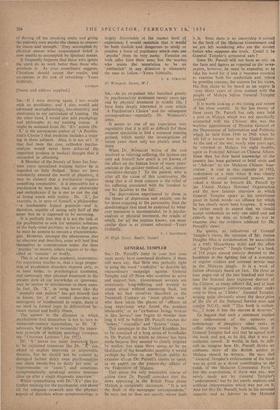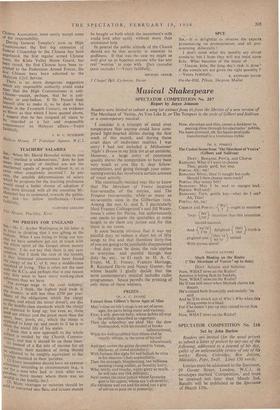Sia,—Dr. Purcell's letter in your last issue must surely have
convinced doubters, if there still were any, that Strix was perfectly right in using the word 'vindictive' to describe his extraordinary campaign against General Templer and all those who continue to serve and support him. Government servants arc notoriously long-suffering and trained to accept. abuse without answering back, but When we find ourselves described in the Twentieth Century as ' more pliable men' who have taken the places of ' officers of long experience whp found the position intolerable,' or as 'ex-human beings broken in like horses,' one begins to wonder how long it will be before Dr. Purcell reaches the ' lackey,' crocodile' and hyaena ' stage.
This campaign in the United Kingdom has so far consisted of a long series of broadsides by Dr. Purcell, to which no answer has been made 'because they seemed so clearly inspired by malice; but since there seems to be no likelihood of the broadsides stopping it would perhaps be fairer to the British public to examine afresh Dr. Purcell's claims to speak as an expert on the present-day affairs of the Federation of Malaya.
Since Dr. Purcell will not have us rely on the facts and figures as reported in the news- papers, however, he must be expecting us to take his word for it and it becomes essential to examine both his credentials and, where he provides reasons, the reasons for his views, His first claim to be heard as an expert IS ' over thirty years of close contact with the people of Malaya before General Templer a rrived: It is worth looking at the timing and nature of his close contact. In the last twenty of these years Dr. Purcell has only once held a post in Malaya which was not specifically connected with the Chinese: this was the wartime appointment of Director General of the Department of Information and Publicity which he held from 1940 to 1941 when he left for a lecture tour in the United States. At the end of the war, nearly nine years ago, he returned to Malaya• for eight months, again as Principal Adviser on Chinese Affairs. Since then his first hand knowledge of , the country has been gathered in brief visits and as ' Adviser' to the Malayan Chinese Asso- ciation. A visit in this capacity in 1952, undertaken at a time when it was clearly essential to avoid communal tension, pro- voked a threat to boycott Dr. 'Purcell by the United Malays National Organisation and the now famous interview at which General Templer spoke to his unwelcome guest in harsh words—an offence for which he has clearly never been forgiven. it would be rather much to expect that we should accept credentials so -very one sided and not entirely up to date so blindly as not to examine also the evidence adduced for Dr, Purcell's views.
He quotes, as indications of General Templer's -views, the opinions of Mr. Justice Douglas (this is condemnation by association in a truly Macarthyan style) and the affair of ' Jungle Green.' 'Jungle Green' is a book of 214 pages almost entirely devoted to the hardships in the fighting line of a company of regular soldiers and national service men in the Malayan jungle. It is a work of fiction obviously based on fact. On three or four pages out of the two hundred and four- teen the fictional hero expresses distrust of the Chinese, as many officers did, and at least once in imaginary conversations other ranks refer to them as Chinks.' General Templer, writing quite obviously about the descr:ption of the life of the National Service man and regular N.C.O., said: " This book is authen- tic.. I hope it has the success it deserves."
Chinese Association, must surely accept some of the responsibility. During General Templer's term as High Commissioner the first big extension of Federal Citizenship to the Chinese has been negotiated, the first regular armed Chinese force, the Kinta Valley Home Guard, has .been raised, the first Chinese have been re- cruited to the Federation Armed Forces, the first Chinese have been admitted to the Malayan Civil Service.
There is no more dangerous suggestion which any responsible authority could make than that the High Commissioner is anti- Chinese—except, perhaps, that he is anti- MalaY or anti-Indian. If Dr. Purcell finds himself able to make it, as he does in his article in the Twentieth Century, on evidence as flimsy as that which I have quoted above, suggest that he has resigned all claim to he regarded as a fair and responsible commentator on Malayan affairs.—Yours faithfully,
A. D. C. PETERSON



































 Previous page
Previous page